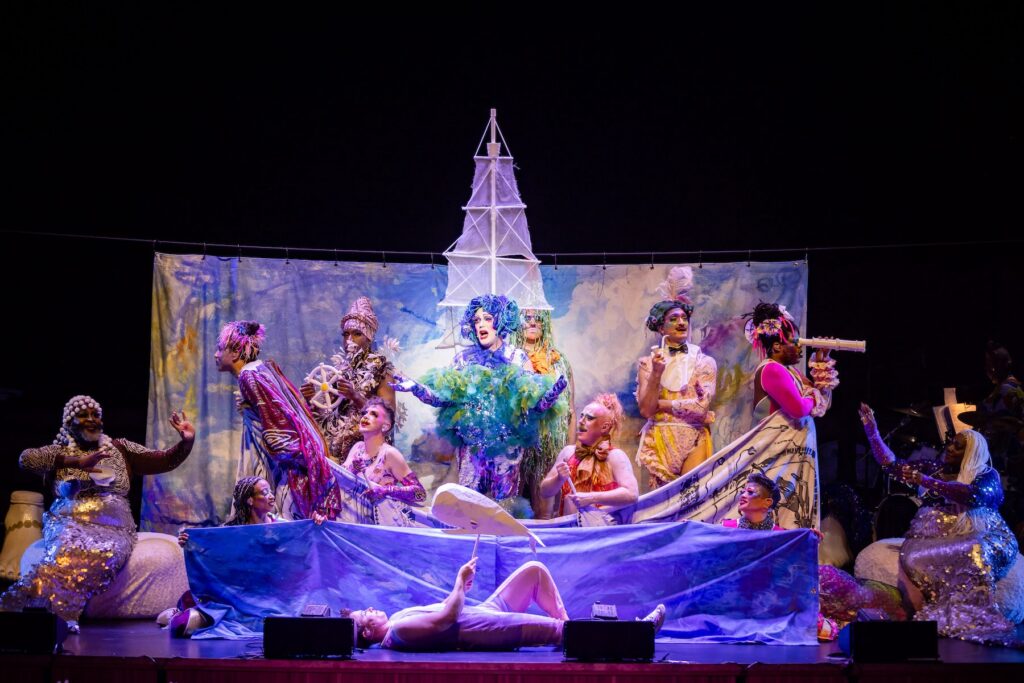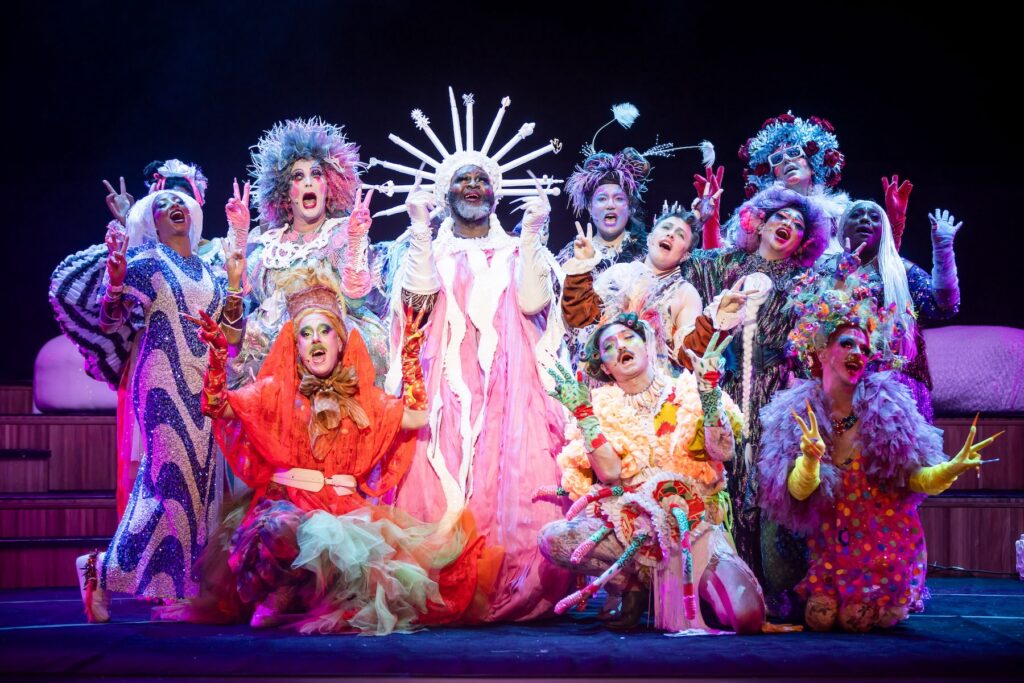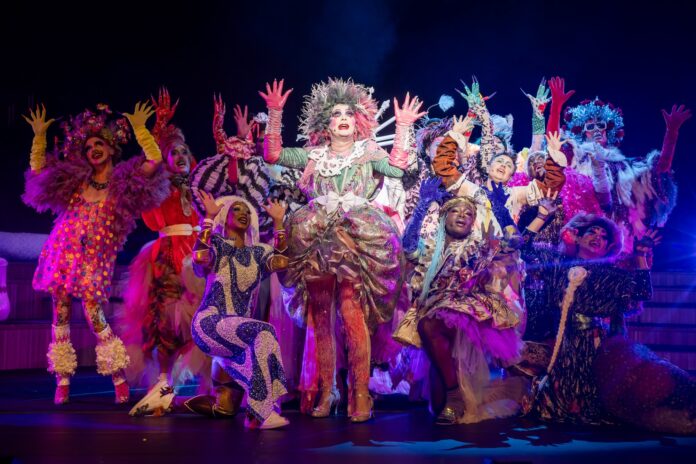Oh nothing, just an outlandish, four-hour convocation of a brilliant queer pantheon, full of song and sparkle, inspired by a foundational deity who slays demons every night, and returns every morning to bring the light of day. For performer Taylor Mac, his latest stage extravaganza, “Bark of Millions” (Fri/23-Sun/25, presented by Cal Performances at Zellerbach Hall, Berkeley), is a stroll through a starry park compared to his previous ecstatic ritual, the 24-hour “24-Decade History of Popular American Music,” and his earlier five-hour “The Lily’s Revenge: A Flowergory Manifold.”
Radical formats, outsize spectacles, sheer variety, and ever-evolving concepts are part and parcel when it comes to Mac’s maximalist productions. As he says, “You can never truly create a queer utopia onstage; you just can’t fit enough up there.” (Mac also uses the pronoun judy.) Whereas “24-Decade” drew on and enlarged the Great American Songbook to queer all of US history and beyond, the rock opera-like “Bark of Millions” introduces new songs, composed with longtime collaborator Matt Ray, that take inspiration from 55 queer muses, one song for each.
This being a Taylor Mac show, however, don’t expect anything straightforward in terms of chronology (the number of songs corresponds to the number of years since Stonewall), reference, of even the meaning of “song.” The point is to put the audience into a “queer trance” through theatrical and musical ritual, using all the charms and deep knowledge of stage history that Taylor Mac musters with his merry band including splendid costume designer Machine Dazzle, choreographer Faye Driscoll, local performer “and one of my favorite humans ever” El Beh, Irish queer performance pioneer Stephen Quinn, powerhouse vocalist Thornetta Davis, and drag sensation Le Gateau Chocolat.
A real community comes to the stage, creating “harmony, duets, ensemble pieces—we overflow with music and it makes its way out into the audience,” as Mac puts it. In short, “I’m trying to hypnotize everyone into being more queer.” I spoke with Mac about “Bark of Millions” and his necessary energies via Zoom from his studio in New York.
48 HILLS The title “Bark of Millions” comes from the myth of Atum, the primordial Egyptian god of the universe. How did you encounter that myth, what was the spark from that which set this show alight?
TAYLOR MAC I was doing a lot of research on queer deities. The show is ever-growing, but right now it’s a 55-song show, and every song is inspired by a queer deity throughout world history. I came upon Tu’er Shen, a Taoist rabbit deity that is responsible for gay male love; Bhagavati-devi, a Hindu goddess of, essentially, drag; and then there’s Ra, also known as Atum and other names, who was gender-queer, assuming male and female aspects, and also one of the first gods in recorded history. What’s fascinating to me about Ra is that a bunch of people in an ancient culture decided that the main god they would worship is gender-queer. A lot of people grew up thinking that queerness is the antithesis of spirituality, but in fact it may be the root of spirituality.
I was really drawn to that idea. The actual Bark of Millions is a boat that Atum sails across the heavens carrying the sun behind it. At night, Atum does battle with chaos, but arrives victorious at the start of every single day. That, to me, felt very queer. We do battle throughout the centuries, but no matter how hard they try to eliminate us, we are born again. We are born again. You can oppress us for millennia, but you can’t get rid of us. There’s something really fierce about that. It’s like Mother Nature saying, ‘No. These are my special children. No.’
48 HILLS That ever-glowing presence ties into the notion of an ever-expanding and expansive show like “Bark of Millions,” a resilience of our queer nature that only grows.
TAYLOR MAC I do believe that nature is queer. Nothing in nature is straight. Nothing is minimal. Minimalism and heterosexuality feel like this revolt against the natural world. And when I say ‘straight’ I don’t mean attraction to a man or a woman or whomever—just that everything is curved, everything is bent. Everything is odd. We, as queer beings ourselves, are the root of nature. So it’s fun to meditate on that concept for four hours, and do it in song, through songs. I’ve actually said more just now than I do in the entire show!

48 HILLS About those songs. The number 55 is significant since that’s just about the number of years it’s been since Stonewall. Is the concept in the show that there’s one song that represents each year?
TAYLOR MAC Stonewall was really just an organizing principal for the show, something to begin with for the show’s composer Matt Ray and me as a writer. There’s nothing literal or chronological beyond that. My feeling is that there is something relentless about the show. You know, as queer people we have these defenses in order to survive in the world. Sometimes our defenses are party, party, party. And sometimes they are about isolating, cynical, even bitter—all these different ways how we protect ourselves from having to engage with the world.
So the show really is designed, song after song after song, to break down those defenses. I knew for that, it had to be longer than most shows, to kick us out of the idea that it’s a “show,” and more of an experience, a ritual. It becomes a performance art piece by making it just longer than what you usually get to experience. So it’s relentless. But it’s relentlessly joyful. And it also deals with so much pain. It’s back and forth and always surprising. It’s not linear in any way, it’s not about Stonewall, it actually doesn’t even start with Stonewall, but the first Gay Liberation march after Stonewall, which was a year later. So really, 54 songs plus a cherry on top.
All of the songs are inspired by a different queer person in world history, but some of them lived long, long before Pride marches. Some are alive now, but some are dead for centuries. None of the songs are about those people, they are our muses, to root us in a consideration of queerness. We’re not trying to teach the audience about our queer antecedents, we leave that to the queer historians.
48 HILLS I think if you asked even many queer people, even now, to gather in their mind 55 queer people throughout history it might prove difficult, since so much queer history has been lost or is just now being reclaimed. How did you gather this particular pantheon of deities for the show?
TAYLOR MAC It’s combination of people we all know like Marsha P. Johnson and Bayard Rustin—although I was flabbergasted at the amount of people who did not know Rustin was gay until the bio-pic came out last year. It never ceases to amaze me how little history has actually transcended into the community. For the most part, though, we know about people like Marsha P. Johnson and Sylvia Rivera and James Baldwin.
But it’s also inspired by people I met along the way, like a drag queen in Myanmar named Shwe Shwe, she was the den mother of a beauty salon where queers can gather, a safe space but it’s really just a shack, and she takes care of them all. In the midst of all these monks using religion to create genocide, and stripping people of their rights—it’s really just hard to be queer there, and yet she was there. I met her and was inspired by her and said, “I’m going to write a song about her.”
Some people I had to research, like Niankhkhnum and Khnumhotep, two ancient Egyptian manicurists at the palace who were buried together. You would never bury men together like they were back then, so it’s clear that they were an exception. I’m very lucky that there are a lot of queer historians now opening up the world to us.

48 HILLS How would you say that this show has developed in terms of your own artistic evolution, compared to your past shows?
TAYLOR MAC I think of these certain shows as a triptych. Lily’s Revenge was the first one, and then 24 Decade, and this is the third one. We’re a group of people—like costume designer Machine Dazzle, composer Matt Ray, lighting designer John Torres, director Faye Driscoll—who have been working together on and off for many years. And we have found our aesthetic. This one is a bit more sculptural, I think. It’s more mythical, in some ways. 24 decade was about infiltrating the world, and this is so much about making our own world.
We make our queer utopia onstage visually, even though you can never put enough on stage to make a queer utopia. We leaned into the idea that we’re making “a queer little hole called the world”, which is a guiding principle of what we do. That’s from a letter from Herman Melville to Nathaniel Hawthorne, a love letter.
48 HILLS We’re living through a moment of what feels like a shrinkage of queer rights and freedoms of expression, even as we’re expanding ourselves into new spaces—you wouldn’t have the backlash if you didn’t have the advancement. How important is it for us to rip this queer little hole in the world for ourselves right now?
TAYLOR MAC I think it’s not just for us, it’s for the oppressor. I do what I do for those straight people, too—to show that when you oppress yourself when you oppress others. To me it’s like Gaza. If you’re going to kill people you’re going to get killed. The only solution to violence is non-violence. And the only solution to straight pain is queer joy. Straight people and cis people have a lot of pain in them. They’re dealing with a lot of pain, and they’re putting it on us. They’ve been raised that the solution to their pain is to oppress other people. And we know that’s not the solution.
The more we hang out in our queerness, the more we shine a light on all this. People like Marsha P. Johnson who was so gentle, and Harry Hay, who wanted to understand queerness outside of the realm of heterosexual expressions, the more we follow these leads, the better it is for everybody. I always say, this is a reverse conversion therapy session. It’s for everyone. But instead of trying to make everyone straight, we’re trying to make everyone queer. We’re doing this four-hour therapy session in song that says, “Find your way to your queerness. Find your way to your queerness.”
TAYLOR MAC: BARK OF MILLIONS Fri/23-Sun/25, presented by Cal Performances at Zellerbach Hall, Berkeley. More info here.






